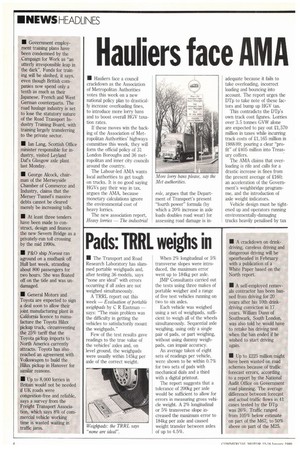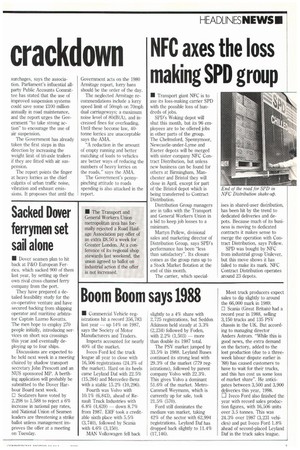auliers face AMA
Page 6

Page 7

If you've noticed an error in this article please click here to report it so we can fix it.
• Hauliers face a council crackdown as the Association of Metropolitan Authorities votes this week on a new national policy plan to drastically increase overloading fines, to introduce more lorry bans and to boost overall HGV taxation rates.
If these moves win the backing of the Association of Metropolitan Authorities' highways committee this week, they will form the official policy of 31 London Boroughs and 36 metropolitan and inner city councils around the country.
The Labour-led AMA wants local authorities to get tough on trucks. It is no good saying HGVs pay their way in tax, argues the AMA, because monetary calculations ignore the environmental cost of heavy lorries.
The new association report, Heavy lorries — The industrial
role, argues that the Department of Transport's present "fourth power" formula (by which a 20% increase in axle loads doubles road wear) for assessing road damage is in
adequate because it fails to take overloading, incorrect loading and bouncing into account. The report urges the DTp to take note of these factors and bump up HGV tax.
This contradicts the DTp's own track cost figures. Lorries over 3.5 tonnes GVW alone are expected to pay out £1,570 million in taxes while incurring track costs of £1,165 million in 1988/89; pouring a clear "profit" of £405 million into Treasury coffers.
The AMA claims that overloading is rife and calls for a drastic increase in fines from the present average of 2160; an acceleration of the Government's weighbridge programme, and the introduction of axle weight indicators.
Vehicle design must be tightened up and operators running environmentally-damaging trucks heavily penalised by tax surchages, says the association. Parliament's influential allparty Public Accounts Committee has stated that the use of improved suspension systems could save some £100 million annually in road maintenance, and the report urges the Government to take strong action" to encourage the use of air suspension.
The Government has already taken the first steps in this direction by increasing the weight Limit of tri-axle trailers if they are fitted with air suspension.
The report points the finger at heavy lorries as the chief culprits of urban traffic noise, vibration and exhaust emissions. It proposes that until the Government acts on the 1980 Armitage report, lorry bans should be the order of the day.
The neglected Armitage recommendations include a lorry speed limit of 50mph on 70mph dual carriageways; a maximum noise level of 80dB(A), and increased fines for overloading. Until these become law, 40tonne lorries are unacceptable says the AMA.
"A reduction in the amount of empty running and better matching of loads to vehicles are better ways of reducing the numbers of heavy lorries on the roads," says the AMA.
The Government's pennypinching attitude to roads spending is also attacked in the report.
































































































